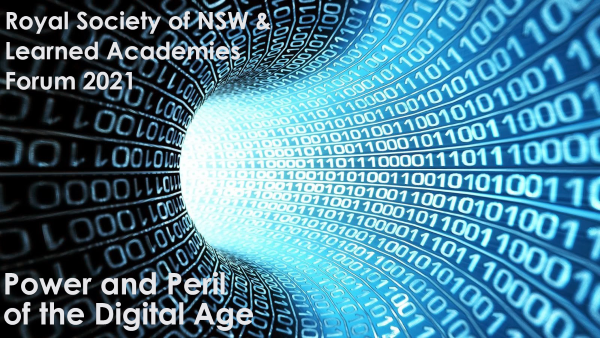Speeches delivered at Society Events
Collected on this page are speeches delivered at major Society events, commencing with the addresses delivered at the 200th Anniversary Dinner of the Royal Society of NSW.
RSNSW 200th Anniversary Dinner — 24 June 2022
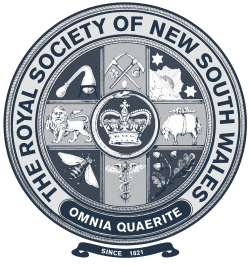 The Society’s bicentennial year culminated in a black-tie gala dinner on 24 June 2022 to celebrate its achievements over 200 years. The dinner was held in the Great Hall of The University of Sydney.
The Society’s bicentennial year culminated in a black-tie gala dinner on 24 June 2022 to celebrate its achievements over 200 years. The dinner was held in the Great Hall of The University of Sydney.
Nearly three hundred attendees heard from:
- Dr Susan Pond AM FRSN, President, Royal Society of NSW, who delivered the President’s Address
- Dr Alan Finkel AC—neuroscientist, inventor, researcher, entrepreneur, educator, policy advisor, and philanthropist—who delivered the after-dinner address titled “Choose your Flight to the Future”.
Bequests
The Royal Society of NSW, the oldest learned institution in Australia, exists to enrich lives through knowledge and inquiry.
Since its inception, the Society has benefited greatly from generous donations and bequests from both members and other benefactors.
Please consider leaving a legacy to the future by remembering the Society in your will. On this page, you can find:
- Why leave a gift in your will?
- How to leave a gift in you will
- Proposed wording for a gift in your will
- Management of Gifts in Wills by the Royal Society of NSW
- How we thank you
Why leave a gift in your will?
No matter what size, a gift in your will make a difference.
Your gift will strengthen the Society as an inclusive and diverse learned institution that is dedicated to its ideals:
- Commitment to advancing the best interests of society — advancing knowledge and understanding for a more just, sustainable, and secure society.
- A questioning spirit — supporting the principles of freedom of thought and speech, and the scientific method of inquiry.
- Diverse and inclusive engagement — embracing and including individual differences and contributions to our collective success and social engagement.
- Boldness and innovation — acting with courage to address issues of the day, take calculated risks, and to innovate as modern technologies expand ways to communicate.
- Good governance — organisational practices that are ethical, expert, inclusive, respectful, courteous, consultative, participatory, accountable, and sustainable.
Your gift will:
- ensure that the Society, which already has a 200-year history, continues to resonate with our desire as humans to explore all corners of knowledge.
- strengthen the Society as an inclusive and diverse learned institution dedicated to ideas that matter in the sciences and humanities.
- ensure that the Society continues to provide the opportunity to meet extraordinary people who are unlocking the secrets of the world around us, and ourselves.
- ensure that the Society plays an even greater role in the intellectual life of future generations who will be forging Australia’s future and creating innovative responses to the challenges that society will face.
- enable the Society to deepen its reach into communities across NSW and help them to shape Australia’s future.
- ensure that, through our prestigious Awards program, the Society continues to foster, celebrate, and promote the excellence of distinguished and rising stars in the sciences and humanities.
- help the Society bring to light for all scholars and citizens its existing library and archives that contain many historical cornerstones of Australian intellectual thought and learning during the past 200 years.
- help us ensure we continue to collect contemporary material that preserves the future history of the Society. • Your gift will inspire the boldness and courage to learn from our past in order to influence our future.
How to leave a gift in you will
An unrestricted bequest is always the most helpful. Your unrestricted gift will allow us to meet immediate needs, ensure a bright future for the work of the Society, and embrace opportunities that we may not otherwise be able to bring to life.
If you are considering making a bequest for a particular aspect of our work, we would welcome the opportunity to discuss your plans before you commit them to a Will, to ensure we can meet your wishes.
Your gift can take a variety of forms including a residual gift, a percentage of your estate, a specific amount, or assets such as shares, property, a book collection, or a work of art.
We also recommend you speak to a solicitor about your intentions.
All enquiries to the Society regarding bequests should be sent by email to the This email address is being protected from spambots. You need JavaScript enabled to view it..
Proposed wording for a gift in your will
Residual
I GIVE .................................... The residue of my estate free of all duties and taxes to The Royal Society of New South Wales, PO Box 576, Crows Nest, NSW 1585 to be applied for its purposes and I DECLARE that the receipt of the President or other proper officer of the Society shall be a full and sufficient discharge to my proper officer of the Society shall be a full and sufficient discharge to my Executor/Trustee for the payment of the gift and that my Executor/Trustee shall not be bound to see to its application.
Percentage
I GIVE .................................... per centum of my estate free of all duties and taxes to The Royal Society of New South Wales, PO Box 576, Crows Nest, NSW 1585 to be applied for its purposes and I DECLARE that the receipt of the President or other proper officer of the Society shall be a full and sufficient discharge to my Executor/Trustee for the payment of the gift and that my Executor/Trustee shall not be bound to see to its application.
Specific
I GIVE the sum of $.................................... free of all duties and taxes to The Royal Society of New South Wales, PO Box 576, Crows Nest, NSW 1585 to be applied to its purposes and I DECLARE that the receipt of the President or other proper officer of the Society shall be a full and sufficient discharge to my Executor/Trustee for the payment of this sum and that my Trustee shall not be bound to see its application.
I GIVE (clearly describe item, work of art, manuscript etc.) free of all duties and taxes to The Royal Society of New South Wales, PO Box 576, Crows Nest, NSW 1585 to be applied to its purposes and I DECLARE that the receipt of the President or other proper officer of the Society shall be a full and sufficient discharge to my Executor/Trustee for the payment of this sum and that my Trustee shall not be bound to see its application.
Management of Gifts in Wills by the Royal Society of NSW
Gifts in Wills are managed by the Royal Society of NSW Council which has responsibility for the Society’s business in accordance with its Act of Incorporation and Rules.
How we thank you
If you would like to notify us of your pledged gift, we will give you the opportunity to relate to the work we do that is of interest to you.
We will also give you appropriate recognition and privileges, with your express permission.
Contents of JProcRSNSW, Vol. 154, Part 2, December 2021
The complete Volume 154, Part 2, December 2021.
Robert E. Marks
Editorial: Dirac, Moyal, and von Neumann.
Journal & Proceedings of the Royal Society of New South Wales 154: 129-132, 2021.
Presidential Paper:
Ian Sloan.
A marriage made in heaven — mathematics and computers
Journal & Proceedings of the Royal Society of New South Wales 154: 133-138, 2021.
Submitted Papers:
Basil Hiley.
The Moyal-Dirac controversy revisited.
Journal & Proceedings of the Royal Society of New South Wales 154: 139-160, 2021.
Edward C. Holmes.
The discovery, origins and evolution of SARS-CoV-2 (COVID-19).
Journal & Proceedings of the Royal Society of New South Wales 154:161-181, 2021.
Jessica Milner Davis.
Taking humour and laughter seriously: The multi-disciplinary field of humour studies.
Journal & Proceedings of the Royal Society of New South Wales 154: 182-200. 2021.
Ghil‘ad Zuckermann.
Revivalistics — a new comparative, global, transdisciplinary field of enquiry.
Journal & Proceedings of the Royal Society of New South Wales 154: 201-210, 2021.
Stan Grant.
With the Falling of the Dusk.
Journal & Proceedings of the Royal Society of New South Wales 154: 211-223, 2021.
Dean Rickles.
Behind the scenes of the 1957 Chapel Hill Conference on the Role of Gravitation in Physics.
Journal & Proceedings of the Royal Society of New South Wales 154: 224-228, 2021.
Malte C. Ebach and Patrick M. Smith.
The art of finding and discovering fossils: a personal perspective.
Journal & Proceedings of the Royal Society of New South Wales 154: 229-238, 2021.
PhD Theses:
Kadhim Al-Sahlani.
Effects of filler and matrix materials on the properties of metal syntactic foams.
Journal & Proceedings of the Royal Society of New South Wales 154: 239-240, 2021.
Mozammel Chowdhury.
A robust multimodal biometric scheme for human recognition and authentication.
Journal & Proceedings of the Royal Society of New South Wales 154: 241-242, 2021.
Anna Cronin.
Toddlers with cleft palate: enhancing communication through holistic child- and family-centred practice.
Journal & Proceedings of the Royal Society of New South Wales 154: 243, 2021.
Meredith Edelman.
Judging the Church: legal systems and accountability for clerical sexual abuse of children.
Journal & Proceedings of the Royal Society of New South Wales 154: 244-245, 2021.
Carlos Garcia Esperon.
Multimodal computed tomography: future applications in acute ischemic stroke.
Journal & Proceedings of the Royal Society of New South Wales 154: 246, 2021.
Danièle Hromek.
The (re)Indigenisation of space: weaving narratives of resistance to embed Nura [Country] in design.
Journal & Proceedings of the Royal Society of New South Wales 154: 247-248, 2021.
Barton E. Lee.
Essays in political economics.
Journal & Proceedings of the Royal Society of New South Wales 154: 249-250, 2021.
Thanh Huong Nguyen.
Information and noise in stock markets: evidence on the determinants and effects using new empirical measures.
Journal & Proceedings of the Royal Society of New South Wales 154: 251-252, 2021.
Sunita Pandey.
Conservation biological control in brassica crops using Australian native plants.
Journal & Proceedings of the Royal Society of New South Wales 154: 253, 2021.
Shafin Rahman.
Zero-shot learning: recognition, tagging, and detection of novel concepts.
Journal & Proceedings of the Royal Society of New South Wales 154: 254-255, 2021.
Laura Wall.
Modelling cognitive performance in schizophrenia and across tasks.
Journal & Proceedings of the Royal Society of New South Wales 154: 256, 2021.
Kai Wu.
Fast and accurate estimation of angle-of-arrival in millimetre-wave large-scale hybrid arrays.
Journal & Proceedings of the Royal Society of New South Wales 154: 257, 2021.
The Royal Society of New South Wales Proceedings, 2021:
Programmes of events in Sydney, the Southern Highlands, the Hunter, and the Western branches; the Awards 2021; the Gazetting of Fellows, February 2021.
Journal & Proceedings of the Royal Society of New South Wales 154: 258- , 2021.
ISSN (online): 2653-1305
Royal Society of NSW Awards for 2021
The Council of the Royal Society of New South Wales is pleased to announce its Awards for 2021 at the 1300th Ordinary General Meeting, held online on the evening of 2 February 2022.
These include the Cook Medal, which is the Society’s highest honour, awards for research and scholarly excellence, and awards that recognise substantial service to the Society.
The award winners are listed below, together with links to information about the awards and their recipients.
The Cook Medal
James Cook Medal — Scientia Professor Rose Amal AC FRSN
Awards for Research Excellence
Clarke Medal and Lecture (Zoology) — Distinguished Professor Emeritus Robert John Aitken FRSN
Edgeworth David Medal — Dr Arnold Lining Ju
History and Philosophy of Science Medal — Professor Dean Rickles
Poggendorff Lectureship — Professor Richard Trethowan
Pollock Memorial Lecture — Professor Geraint Lewis FRSN
Warren Prize (Medal and Lectureship) — Dr Noushin Nasiri
Jak Kelly Award — Mx Zain Mehdi
Royal Society of NSW Scholarships — Mr Sajad Abolpour Moshizi, Mr Harry Marquis, and Mr Kevin (The Huong) Chau
Awards for Service to the Society
Royal Society of NSW Citation — The Honourable John Dowd AO QC FRSN
Royal Society of NSW Citation — Mr Hubert Regtop MRSN
Royal Society of NSW Citation — Mr Richard Wilmott MRSN
James Cook Medal
Scientia Professor Rose Amal AC FRSN FAA FTSE
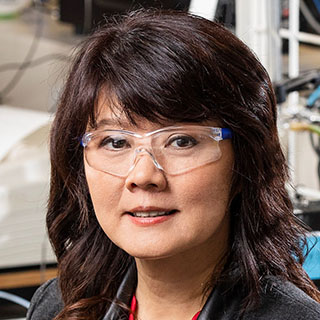
The James Cook Medal is awarded periodically by the Royal Society of New South Wales for outstanding contributions to science and human welfare in and for the Southern Hemisphere.
Professor Amal AC FRSN FTSE FAA, Scientia Professor of Chemical Engineering at UNSW (Sydney), is an acknowledged international leader in the field of chemical engineering. Her research has changed the way in which the properties of catalysts are understood, with her scientific breakthroughs in catalysis leading to real-world applications for sustainable environment and energy applications. In particular, she is renowned for her photocatalysis breakthroughs for large-scale industrial water treatment, and the generation of ‘clean hydrogen’ i.e., the production of hydrogen from water using solar energy powered by an electrolyser, including the generation of hydrogen directly from seawater. Her contributions to science and human welfare in and for the Southern Hemisphere have been extensive.
Return to the top of the page
Awards For Research Excellence
Clarke Medal and Lecture (Zoology)
Distinguished Professor Emeritus Robert John Aitken FRSN FAA FAHMS FRSE
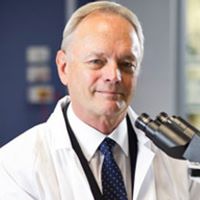 The Clarke Medal is awarded each year for distinguished research in the natural sciences, conducted in Australia and its territories, in the fields of botany, zoology, and geology (considered in rotation). For 2021, the medal has been awarded in zoology.
The Clarke Medal is awarded each year for distinguished research in the natural sciences, conducted in Australia and its territories, in the fields of botany, zoology, and geology (considered in rotation). For 2021, the medal has been awarded in zoology.
Distinguished Professor Emeritus John Aitken, of the College of Engineering, Science and Environment at the University of Newcastle, is a global leader in reproductive biology and the 2012 NSW Scientist of the Year. Based at the University of Newcastle, he is President of the International Society of Andrology, Director of the Priority Research Centre in Reproductive Science and Professor of Biological Sciences. Professor Aitken heads up a research team that is making significant inroads into human and animal reproductive issues. His research achievements include identifying a major cause of male infertility that has resulted in new methods of therapeutic intervention, and the development of a contraceptive that would prevent pregnancy and inhibit the spread of sexually transmitted diseases.
Professor Aitken currently has an active program of research to develop non-surgical methods of sterilisation for domestic and feral animals. Nationwide, the damage done by vertebrate pests to Australian biodiversity and agricultural productivity amounts to $1 billion per annum. In response to this need, Professor Aitken’s research group has developed a technology for the non-surgical sterilization of mammalian species that opens up a market worth billions of dollars per annum.
Return to the top of the page
Edgeworth David Medal
Dr Arnold Lining Ju
 The Edgeworth David Medal is awarded annually for distinguished research by a young scientist under the age of 35 years for work undertaken mainly in Australia or contributing to the advancement of Australian science.
The Edgeworth David Medal is awarded annually for distinguished research by a young scientist under the age of 35 years for work undertaken mainly in Australia or contributing to the advancement of Australian science.
Dr Lining Arnold Ju, an ARC DECRA Fellow in the Faulty of Engineering at the University of Sydney, employs innovative and cutting-edge research in mechanical engineering and biomechanics to open new avenues for the diagnosis, monitoring, and treatment of blood clotting diseases. In just 8 years since his PhD award and under 35 years of age, he has been an ARC DECRA Fellow and a Heart Foundation Future Leader Fellow and has won awards such as the MIT TR35 Innovator, the Australian Museum Eureka Prize and NSW Young Tall Poppy. His academic standing is on a steep upward trajectory nationally and internationally. He is now spearheading his own Cardiovascular Biomechanics Lab for organ-on-chip blood clot assessment and the development of future cardiovascular point-of-care tests and telehealth microdevices.
Return to the top of the page
History and Philosophy of Science Medal
Professor Dean Rickles
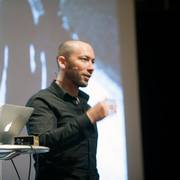 The Society’s History and Philosophy of Science Medal is awarded annually to recognise outstanding achievements in the History and Philosophy of Science, especially the study of ideas, institutions, and individuals of significance to the practice of the natural sciences in Australia.
The Society’s History and Philosophy of Science Medal is awarded annually to recognise outstanding achievements in the History and Philosophy of Science, especially the study of ideas, institutions, and individuals of significance to the practice of the natural sciences in Australia.
Professor Dean Rickles, who is Professor of History and Philosophy of Modern Physics at the University of Sydney, has made seminal contributions to both the history and the philosophy of modern physics, creating two-way traffic from conceptual and philosophical issues to historical ones. His work has been used and praised by philosophers, historians, and physicists alike. In particular, he has been a central figure in the emerging field of history and philosophy of quantum gravity (the as yet unknown theory that would treat our two great fundamental theories of physics, general relativity and quantum theory, in a single framework), and has driven much of the current research landscape. He has been responsible for many firsts, including the first detailed histories of string theory, praised by its chief architect (John Schwarz), and of quantum gravity, and the first philosophical papers on dualities and loop quantum gravity.
Poggendorff Lectureship
Professor Richard Trethowan
 The Poggendorff Lecture is awarded periodically for research in plant biology and more broadly agriculture.
The Poggendorff Lecture is awarded periodically for research in plant biology and more broadly agriculture.
Professor Richard Trethowan, Director of the IA Watson Research Centre, Narrabri Plant Breeding Institute and a member of the School of Life and Environmental Sciences at the University of Sydney, is a world-leading plant breeder. His work has improved our understanding of the genetic control of heat resistance in wheat, an important trait globally, and he contributed significantly to the development of new technologies including hybrid wheat systems and the application of genomic selection to plants. His work led to the development of unique genetic wheat strains that have impacted the productivity of agricultural systems in many countries. These impacts include the release of wheat cultivars to farmers from his experimental materials, either directly, through their use as parents, or the application of knowledge generated from his research.
Return to the top of the page
Pollock Memorial Lectureship
Professor Geraint Lewis FRSN FLSW

The Pollock Memorial Lectureship has been awarded approximately every four years since 1949 and is sponsored by the University of Sydney and the Society in memory of Professor J.A. Pollock, Professor of Physics at the University of Sydney (1899-1922) and a member of the Society for 35 years.
As an outstanding researcher, Professor Geraint Lewis, Professor of Astrophysics in the Sydney Institute for Astrophysics in the School of Physics of the University of Sydney, focuses on cosmological mysteries. Through exquisite and extensive observations with the world’s largest telescopes coupled with synthetic universes generated on immense supercomputers, he hunts for the dark side — the dark matter and dark energy that shape the cosmos. With significant discoveries that confront our ideas on the formation and evolution of galaxies, he has published extensively in international journals. His passion for cosmology and physics is reflected in his teaching and student supervision, as well as an extensive outreach program that brings the mysteries of the universe to diverse international audiences.
Return to the top of the page
Warren Prize (Medal and Lectureship)
Dr Noushin Nasiri
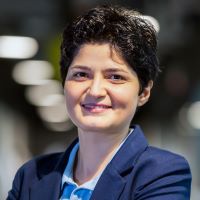
The Warren Prize consists of a medal and lectureship in recognition of research by engineers and technologists in their early to mid-career. Early-career researchers will have established a publication record in top-tier journals and wish to reach a broader audience, while mid-career researchers will have completed a larger body of work relevant to society.
Dr Noushin Nasiri is a Senior Lecturer in the Macquarie University School of Engineering and is Head of the Macquarie Nanotech Laboratory. She is a dynamic early career researcher whose work, which is highly regarded and recognised, combines multidisciplinary techniques in the field of nanomaterials, nanoelectronics, and chemistry to develop innovative nanomaterials that transform nanosensing technologies. Her work has already resulted in practical, beneficial outcomes, such as the world’s first wearable sensor, capable of differentiating between UVA and UVB rays, that alerts users in real-time to over-exposure to UV radiation. The technology is tailored for individuals, taking into account different skin types when calculating sun-safe limits.
Jak Kelly Award
Mx Zain Mehdi
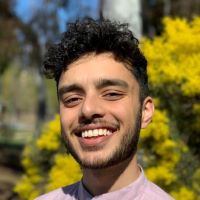 The Jak Kelly Award was created in honour of Professor Jak Kelly (1928–2012), who was Head of Physics at the University of NSW from 1985 to 1989, was made an Honorary Professor of the University of Sydney in 2004, and was President of the Royal Society of NSW in 2005 and 2006. Its purpose is to encourage excellence in postgraduate research in physics. The award is supported by the Royal Society of NSW and the Australian Institute of Physics, NSW branch. The winner is selected from a shortlist of candidates who made presentations at the most recent Australian Institute of Physics (NSW Branch) postgraduate awards meeting.
The Jak Kelly Award was created in honour of Professor Jak Kelly (1928–2012), who was Head of Physics at the University of NSW from 1985 to 1989, was made an Honorary Professor of the University of Sydney in 2004, and was President of the Royal Society of NSW in 2005 and 2006. Its purpose is to encourage excellence in postgraduate research in physics. The award is supported by the Royal Society of NSW and the Australian Institute of Physics, NSW branch. The winner is selected from a shortlist of candidates who made presentations at the most recent Australian Institute of Physics (NSW Branch) postgraduate awards meeting.
Zain Mehdi, a PhD Candidate in the Department of Quantum Science and Technology at the Australian National University, investigates quantum physics in the mesoscopic regime — the intermediate scale between the microscopic world of individual atoms and the macroscopic world of classical objects. Their work focuses on theoretical investigations of exotic phenomena, such as superfluidity and turbulence, in cold atom systems, and has led to four publications in high-impact journals.
Royal Society of New South Wales Scholarships
The Royal Society Scholarships are awarded annually in order to acknowledge outstanding achievements by young researchers in any field of science. Applicants must be enrolled as research students in a university in either NSW or the ACT on 1 January in their year of nomination.
For 2021, three RSNSW Scholarships have been awarded:
- Mr Sajad Abolpour Moshizi — PhD Candidate, Macquarie University
- Mr Harry Marquis — PhD Candidate, University of Sydney
- Mr Kevin (The Huong) Chau — Master of Research candidate, Macquarie University
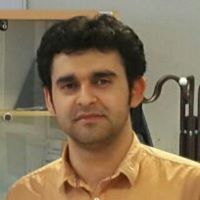
Sajad Abolpour Moshizi is conducting research on the the development of hair-cell sensors for use inside the semicircular canals in the inner ear to treat patients suffering from balance problems and gaze instability. He is a recipient of the Biomolecular Discovery Research Centre (BDRC) Postgraduate Prize and winner of the best internationally peer-reviewed paper by a postgraduate student as a first author accepted for publication (“Development of an ultrasensitive, and flexible piezoresistive flow sensor using vertical graphene nanosheets”) in Nano-Micro Letters. He is a recipient of a Macquarie University Postgraduate Research Fund (PGRF) scheme of up to $3000 and has more than 30 peer-reviewed journal articles.
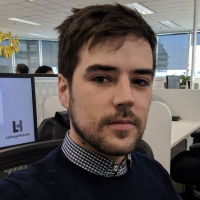
Harry Marquis is a PhD candidate in the School of Physics at the University of Sydney. His research is primarily conducted at the Department of Nuclear Medicine, Royal North Shore Hospital, under the supervision of Professor Dale Bailey. His project is titled “Development of a Dosimetry Platform for Theranostic Agents” and his key research interests are in quantitative PET and SPECT imaging, diagnostic medical imaging and image processing, theranostics and radionuclide therapy dosimetry, radiobiology and radiation safety. Harry’s research has already gained international recognition, receiving the Arthur Weis Award in 2020 for outstanding original work in radiation safety and dosimetry from the Society of Nuclear Medicine and Molecular Imaging (SNMMI). In 2021, his work was featured in the SNMMI plenary lecture highlights “Basic Science Instrumentation & Data analysis: Image Generation” session and was also shortlisted for the best poster award in the physics track.
 Kevin Chau joined the Analytical Glycoimmunology team at Macquarie University (MQ) in April 2018 as an undergraduate volunteer to study the removal of synapses by microglial receptors in the brain during sleep. After completing his course work to near-perfection, he decided to undertake a Master of Research (MRes) degree focusing on platelet glycobiology. During the past 3–4 years he has shown great potential and talent, demonstrated, for example, by the award of multiple prestigious scholarships and prizes during his coursework progress. His research focuses on mapping the glycoproteome of human platelets.
Kevin Chau joined the Analytical Glycoimmunology team at Macquarie University (MQ) in April 2018 as an undergraduate volunteer to study the removal of synapses by microglial receptors in the brain during sleep. After completing his course work to near-perfection, he decided to undertake a Master of Research (MRes) degree focusing on platelet glycobiology. During the past 3–4 years he has shown great potential and talent, demonstrated, for example, by the award of multiple prestigious scholarships and prizes during his coursework progress. His research focuses on mapping the glycoproteome of human platelets.
Awards for Service to the Society
Royal Society of NSW Citations
The Royal Society of NSW Citations are awarded to Members or Fellows of the Society who have made significant contributions to the Society, but who have not been recognised in any other way. A maximum of three Citations may be awarded in any one year.
The Honourable John Dowd AO QC FRSN
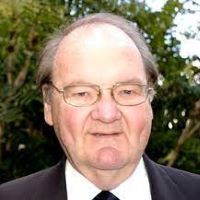 Having previously served in prominent roles in the NSW Parliament and NSW Government, in 2002, The Honourable John Dowd AO QC FRSN was elected as Chancellor of Southern Cross University, serving until his retirement in 2014. In 2005, he was appointed Protection Ambassador for ActionAid Australia (previously AUSTCARE) and became a Director of the organisation in 2008 and President in 2009. In May 2011, Dowd launched The Justice Campaign in a show of support for human rights and justice with a focus on alleged abuses at Guantanamo Bay, Abu Ghraib, and elsewhere with a particular focus on David Hicks.
Having previously served in prominent roles in the NSW Parliament and NSW Government, in 2002, The Honourable John Dowd AO QC FRSN was elected as Chancellor of Southern Cross University, serving until his retirement in 2014. In 2005, he was appointed Protection Ambassador for ActionAid Australia (previously AUSTCARE) and became a Director of the organisation in 2008 and President in 2009. In May 2011, Dowd launched The Justice Campaign in a show of support for human rights and justice with a focus on alleged abuses at Guantanamo Bay, Abu Ghraib, and elsewhere with a particular focus on David Hicks.
John Dowd provided the Royal Society of NSW with outstanding service in 2020 when he provided extensive pro bono legal advice over an extended period of time on the revision of the Society’s Rules which had not been comprehensively reviewed since 1968. This exercise was complex and extensive and involved liaison with a wide range of members of the Society. It resulted in a modernised set of Rules which will stand the Society in good stead for many years to come. This outcome could not have been achieved without his input.
Mr Hubert Regtop MRSN
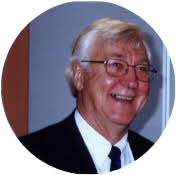 Hubert Regtop MRSN is a biochemist and microbiologist with a Master of Science from the University of NSW (1973). He has a long and esteemed career as a university lecturer, research fellow, and research director of publicly listed companies, receiving multi-million dollar grants, and responsible for hospital funded projects and partnerships with universities in the US and UK. In the mid-nineties, he was responsible for introducing standardised herbs in Australia. As a director of Trilogie Pty Ltd, established in 1994, he currently consults and lectures to major health food companies, doctors, and pharmacists in Australia, on the role of nutrition in medicine. He has authored twenty-two publications and has had twenty-three patents approved. He has been a long-standing Chair of the Society’s Southern Highlands Branch to which he has made a significant contribution over ten years maintaining an active branch with a strong events program.
Hubert Regtop MRSN is a biochemist and microbiologist with a Master of Science from the University of NSW (1973). He has a long and esteemed career as a university lecturer, research fellow, and research director of publicly listed companies, receiving multi-million dollar grants, and responsible for hospital funded projects and partnerships with universities in the US and UK. In the mid-nineties, he was responsible for introducing standardised herbs in Australia. As a director of Trilogie Pty Ltd, established in 1994, he currently consults and lectures to major health food companies, doctors, and pharmacists in Australia, on the role of nutrition in medicine. He has authored twenty-two publications and has had twenty-three patents approved. He has been a long-standing Chair of the Society’s Southern Highlands Branch to which he has made a significant contribution over ten years maintaining an active branch with a strong events program.
Mr Richard Wilmott MRSN
![]() Richard Wilmott MRSN was the Principal of the accounting firm RJ Wilmott & Co. In 2013 he was approached by Council to undertake the audit of the Society’s financial records from 2011 onwards. Richard completed the audit on a pro bono basis and then was persuaded to become the Society’s Honorary Treasurer and member of the Executive, positions which he held until March 2021. In 2014, the Society moved all its administration to a specialist organisation and Richard worked closely with that organisation to update and improve all aspects of the Society’s financial record keeping and reporting.
Richard Wilmott MRSN was the Principal of the accounting firm RJ Wilmott & Co. In 2013 he was approached by Council to undertake the audit of the Society’s financial records from 2011 onwards. Richard completed the audit on a pro bono basis and then was persuaded to become the Society’s Honorary Treasurer and member of the Executive, positions which he held until March 2021. In 2014, the Society moved all its administration to a specialist organisation and Richard worked closely with that organisation to update and improve all aspects of the Society’s financial record keeping and reporting.
POWER AND PERIL OF THE DIGITAL AGE
Dates: Thursday and Friday, 4–5 November 2021, 9.00 am–12.30 pm AEDT
Venue: Live-streamed and now on YouTube
Brochure: The brochure is available in two forms:
(a) an abridged document (pdf: 5.8 MB) providing just the program, and
(b) a complete document (pdf: 6.2 MB) providing the program, abstracts, and speaker biographies.
On this page:
Overview
We are at a moment in time when we must acknowledge and address the inevitably rising tide of data use and digital services. History will categorize the early decades of the 21st Century as the digital age, the age of prodigious development and use of digital technologies that enable us to transfer and access information easily and swiftly.
So much so that digital interaction is a defining characteristic of modern human life. Societies, economies, and political processes are infused and connected by the ubiquitous use of smart machines and software that process and communicate information to us in ways that would have been unimaginable just a few years ago.
The pace of digitisation was already fast by the end of 2019 before COVID-19 emerged. The pandemic broke through cultural barriers and enabled implementation of digital strategies in a matter of days or weeks rather than years. Digital technologies are central to dealing with the pandemic itself, as well as being the primary driver of productivity in almost every other aspect of society.
Almost all companies, governments and organisations across the world are increasingly taking advantage of the benefits associated with data analytics, artificial intelligence, and the Internet of Things to solve problems never solved before, to undertake projects in five days that would have taken five years — problems such as those embodied in the United Nations General Assembly’s Sustainable Development Goals and their achievement by 2030. Tangible benefits include greater social connectivity, learning opportunities, information storage, versatile working and transport, and greater access to entertainment, news, banking and finance.
Unlocking the power of the digital age also brings peril, associated with concerns about data security, state-based and transnational crime, and terrorism, complexity, privacy, social disconnection, media manipulation, manipulation of the truth, communities left behind, national defence and market vulnerabilities, outstripping rule-making and regulatory structures.
This year, the Royal Society of NSW in partnership with the Learned Academies - Health and Medicine, Humanities, Science, Social Sciences, and Technology and Engineering, has chosen “Power and Peril of the Digital Age” as the theme for its annual Forum.
Our goal is to have a grown-up conversation about digitisation and the use of data. It will be framed around the future life of a child born on the first day of the Forum, 4 November 2021. This child will be born into a world of increasingly complex digital systems that hold great value and vulnerability.
Starting with a technological framing, the Forum will explore several major aspects which will impact the journey of that child as we approach 2030 and beyond. We will explore aspects of technology, health, defence, and security in a digital age, and the changing nature of industry as the world and society evolves.
Finally, our annual Forum will be a call to arms for the host Societies to focus on challenges identified during the day that must be addressed for Australia to remain a prosperous, successful, and safe democracy in the digital world.
The Royal Society of NSW acknowledges the generous support of Her Excellency, the Honourable Margaret Beazley AC QC, Governor of NSW, the Office of the NSW Chief Scientist and Engineer, and the NSW Smart Sensing Network.
Program and Presentations
| 1.0: Day 1 — Welcome and Official Opening |
|
| Welcome and Acknowledgement of Country Susan Pond AM FRSN FTSE FAHMS President, Royal Society of NSW Official Opening Her Excellency the Honourable Margaret Beazley AC QC Governor of New South Wales Moderator and Rapporteur Ian Oppermann FRSN FTSE Chief Data Scientist, NSW Government Industry Professor, University of Technology Sydney |
|
| 1.1 Science and Technology underpinning the Digital Age: Past, Present, and Future |
|
| Cathy Foley AO PSM FRSN FAA FTSE Australia's Chief Scientist Australian Government Hugh Durrant-Whyte FRS FREng FAA FTSE NSW Chief Scientist and Engineer NSW Government Panel and Q&A |
|
| 1.2 Digital Lifetime of a Child Born Today |
|
| Frances Foster Thorpe Executive Director, Shaping Futures NSW Department of Premier and Cabinet Sue Bennett Professor, Deputy Director and Connected Child Co-Leader, ARC Centre of Excellence for the Digital Child University of Wollongong Panel and Q&A |
|
| 1.3 Avoiding a Digital Dark Age |
|
| Shawn Ross Director, Digitally-Enabled Research (Office of the Deputy Vice-Chancellor (Research)) and Professor of History and Archeology Macquarie University Theresa K D Anderson Social Informaticist, Connecting Stones Consulting and Research Fellow, School of Information Sciences University of Illinois at Urbana-Champaign Panel and Q&A |
|
| 1.4 Health of our Digital Child |
|
| Zoran Bolevich Chief Executive, eHealth NSW Chief Information Officer, NSW Health Louisa Jorm FAHMS Professor, Faculty of Medicine and Foundation Director, Centre for Big Data Research in Health UNSW (Sydney) Panel and Q&A |
|
| 1.5 Safety and Security of our Digital Child |
|
| Dale Lambert PSM FTSE Chief, Cyber and Electronic Warfare Division Defence Science and Technology Group Australian Government Department of Defence Rory Medcalf Professor and Head, National Security College Crawford School of Public Policy Australian National University Panel and Q&A |
|
| 1.6 Setting up for Day 2, including the Challenges |
|
| Ian Oppermann FRSN FTSE (Moderator and Rapporteur) Chief Data Scientist, NSW Government Industry Professor, University of Technology Sydney |
|
| 2.0: Day 2 —Welcome and Recap of Day 1 |
|
| Welcome and Acknowledgement of Country Susan Pond AM FRSN FTSE FAHMS President, Royal Society of NSW Recap of Day 1 (Moderator and Rapporteur) Ian Oppermann FRSN FTSE Chief Data Scientist, NSW Government Industry Professor, University of Technology Sydney |
|
| 2.1 The Light and Shade of Technology on our Digital Child |
|
| Ian Oppermann FRSN FTSE (Moderator and Rapporteur) Chief Data Scientist, NSW Government Industry Professor, University of Technology Sydney Edward Santow Industry Professor, University of Technology Sydney (Former) Australian Human Rights Commissioner The Honourable Verity Firth Executive Director, Centre for Social Justice and Inclusion University of Technology Sydney Marc Fennell Journalist, Interviewer, and Maker of Things Aengus Tran Founder and Chief Executive Officer Harrison.ai Panel and Q&A |
|
| 2.2 Address by NSW Government Minister |
|
| The Hon. Victor Dominello MP Minister for Digital and Minister for Customer Service, Government of NSW Member for Ryde, Parliament of NSW |
|
| 2.3 Securing the Future of our Digital Child |
|
| Ian Oppermann FRSN FTSE (Moderator and Rapporteur) Chief Data Scientist, NSW Government Industry Professor, University of Technology Sydney Robert Hillard Managing Partner Deloitte Consulting Asia Pacific Angie Abdilla Founder and Chief Executive Officer, Old Ways, New Australia Professor of Practice, Faculty of Art, Architecture and Design, UNSW (Sydney) Toby Walsh FRSN FAA Laureate Fellow and Scientia Professor of Artificial Intelligence UNSW (Sydney) David Pryor Senior Team Leader, Energy Security Safeguard NSW Department of Planning, Industry, and Environment Panel and Q&A |
|
| 2.4 Future Australia Short Statements from Learned Academy Representatives |
|
| Ian Oppermann FRSN FTSE (Moderator and Rapporteur) Chief Data Scientist, NSW Government Industry Professor, University of Technology Sydney Tony Cunningham AO FAHMS Australian Academy of Health and Medical Sciences Richard Waterhouse FAHA FASSA Australian Academy of Humanities Toby Walsh FRSN FAA Australian Academy of Science Deborah Lupton FASSA Australian Academy of Social Sciences Annabelle Duncan PSM FRSN FTSE Australian Academy of Technology and Engineering Panel and Q&A |
|
| 2.5 Wrap-up and Close |
|
| Ian Oppermann FRSN FTSE (Moderator and Rapporteur) Chief Data Scientist, NSW Government Industry Professor, University of Technology Sydney |
|

